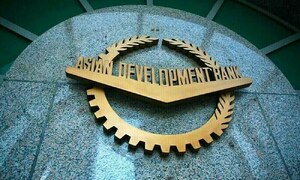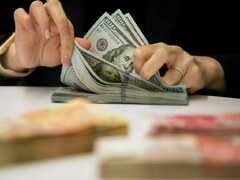The Bank of England said Thursday it had decided to keep its main interest rate at 0.50 percent, as it weighed high UK inflation against Brexit uncertainty. "Our Monetary Policy Committee has voted by a majority of 7-2 to maintain Bank Rate at 0.50 percent," said a statement following a regular meeting.
The MPC added that it was maintaining the amount of cash stimulus pumping around the UK economy at £445 billion ($630 billion, 512 billion euros). While the Bank of England sat tight this time around, minutes of the meeting that ended Wednesday firmed up market expectations that the BoE will raise its key rate by a quarter-point at its next gathering in May.
The cental bank noted that "tightening of monetary policy... will be appropriate to return inflation" to its 2.0-percent target. Regarding Brexit, the minutes said that "developments regarding the United Kingdom's withdrawal from the European Union - and in particular the reaction of households, businesses and asset prices to them - remain the most significant influence on, and source of uncertainty about, the economic outlook".
Britain's annual inflation rate slowed to 2.7 percent in February as food and transport costs rose by less than one year ago, official data showed on Tuesday, but remains far above the target level. In addition, official data this week showing that British wages growth is catching up with overall inflation has cemented expectations of an interest rate hike to 0.75 percent in May.
"We still think that the MPC will hike interest rates in May," Paul Hollingsworth, senior UK economist at Capital Economics, said following Thursday's announcement. "And if the economy continues to surprise on the upside... then that should allow the MPC to raise interest rates twice more before the end of this year," he added.
Official data Thursday showed that British retail sales rebounded in February from the previous month, boosted by growth in food and online purchases. The UK's unemployment rate has meanwhile dipped, reverting to the lowest level since 1975, after a brief rise. "The Bank faces a delicate balancing act," said Ben Brettell, senior economist at Hargreaves Lansdown.
"Inflation seems to be falling back towards the target of two percent, as the effect of the weaker pound starts to filter out of the calculation. "But a pick-up in wage growth points to an erosion of slack in the labour market. This raises the prospect that a wage-price spiral could push inflation back up in future. "Throw in a hefty dose of Brexit-related uncertainty and it's easy to see why the committee is divided at present," he added.
British inflation jumped last year and remains at an elevated level after Britain voted to leave the European Union in 2016. The Brexit referendum pushed down the pound, in turn hiking the cost of imported goods. British Prime Minister Theresa May is in Brussels for a summit where the remaining 27 EU members are expected on Friday to approve a post-Brexit transition period and adopt guidelines for talks on future relations including a trade deal. Britain is on course to formally depart the bloc in March 2019.
BR100
15,085
Increased By
112.5 (0.75%)
BR30
44,012
Increased By
987.7 (2.3%)
KSE100
148,618
Increased By
1274.3 (0.86%)
KSE30
45,248
Increased By
370.7 (0.83%)





















Comments
Comments are closed.